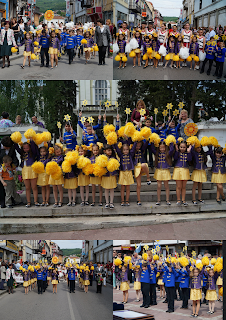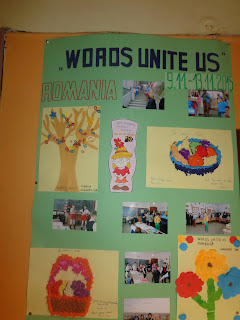Thursday, July 27, 2017
Tuesday, July 25, 2017
Saturday, July 22, 2017
Monday, July 17, 2017
Wednesday, July 12, 2017
The Bulgarian tale "The Lazy Bride"
In a village
grown pretty girl Bogdanka. She was affectionately wore a little child of his
mother.
Grow Bogdanka, become a nice girl, but nothing he could not work.
They began to come to matchmakers want to daughter. Her mother all told:
- Our Bogdanka is stroked. It is not taught to work.
Once chueli fact-laws returned.
Once an old man came and said:
- I heard that you have a nice girl. I came to want a daughter.
Mother and told him the same thing:
- Our Bogdanka is very Galena. She knows nothing work ...
- Nothing - said the old man - in our country no one ever makes a job. Whoever wants - work that will not - so sit.
After a week or two become wedding ...
The old man had three sons and two wives.
The day after the wedding all set to work. Only the bride stood dressed and nothing pohvashtala.
Time for lunch. All gathered and sat down. Seated and Bogdanka. The other wives brought Casseroles and father in law to put bread. He took the bread, broke it in pieces and divided it.
- And for the bride? - Said the mother in law.
- She's not hungry - replied the old man. - When a man does not work, not hungry.
After lunch all again started work. Bride sat and nothing pohvashtala.
They gathered for dinner.
The old man took the bread, broke it, and gave away her again.
- A Bogdanka? - Wondered the mother.
- She's not hungry - replied the old man. - When a man does not work, not hungry.
Dinner, talk who's going to work the next day and went to sleep.
Lying and the bride, but fasting sleep you? I can hardly wait to dawn, it became quietly, wash your eyes amend the yard, milking cows earned calves.
Become and others and seeing the bride, looked at each other and smiling.
Noon bride put first table and sitting last.
The old man broke the bread, filed a down large piece of the bride and said:
- Your spouse today operates the most, here's to you from asking.
Passing in a week or two. Bride bustled all day. In the third week roditelite she came to visit. Spied them from afar and izlezli the yard to meet them.
It dashed bride first, opened portite and quiet their zashushnala:
- Mom ... Dad ... Get out more of the car and get to work. Here is not like home. Here that does not work, do not give him to eat! ...
Grow Bogdanka, become a nice girl, but nothing he could not work.
They began to come to matchmakers want to daughter. Her mother all told:
- Our Bogdanka is stroked. It is not taught to work.
Once chueli fact-laws returned.
Once an old man came and said:
- I heard that you have a nice girl. I came to want a daughter.
Mother and told him the same thing:
- Our Bogdanka is very Galena. She knows nothing work ...
- Nothing - said the old man - in our country no one ever makes a job. Whoever wants - work that will not - so sit.
After a week or two become wedding ...
The old man had three sons and two wives.
The day after the wedding all set to work. Only the bride stood dressed and nothing pohvashtala.
Time for lunch. All gathered and sat down. Seated and Bogdanka. The other wives brought Casseroles and father in law to put bread. He took the bread, broke it in pieces and divided it.
- And for the bride? - Said the mother in law.
- She's not hungry - replied the old man. - When a man does not work, not hungry.
After lunch all again started work. Bride sat and nothing pohvashtala.
They gathered for dinner.
The old man took the bread, broke it, and gave away her again.
- A Bogdanka? - Wondered the mother.
- She's not hungry - replied the old man. - When a man does not work, not hungry.
Dinner, talk who's going to work the next day and went to sleep.
Lying and the bride, but fasting sleep you? I can hardly wait to dawn, it became quietly, wash your eyes amend the yard, milking cows earned calves.
Become and others and seeing the bride, looked at each other and smiling.
Noon bride put first table and sitting last.
The old man broke the bread, filed a down large piece of the bride and said:
- Your spouse today operates the most, here's to you from asking.
Passing in a week or two. Bride bustled all day. In the third week roditelite she came to visit. Spied them from afar and izlezli the yard to meet them.
It dashed bride first, opened portite and quiet their zashushnala:
- Mom ... Dad ... Get out more of the car and get to work. Here is not like home. Here that does not work, do not give him to eat! ...
The Bulgarian song "You are beautiful, my forest!"
You are beautiful my wood
You are beautiful my wood
you smell of spring time
but you inspire in our hearts
only sorrow and
sadness
Who
looks at you only once
he aslways sorrows
that he can't under
yours
shadows to wither
away.
Хубава си моя горо
Хубава си, моя горо,
миришеш на младост,
но вселяваш в сърцата ни
само скръб и жалост.
Който веднъж те погледне,
той вечно жалее,
че не може под твоите
сенки да изтлее.
А комуто стане нужда
веч да те остави,
той не може, дорде е жив,
да те заборави.
The Bulgarian poem "I am Bulgarian"
I am Bulgarian
Аз съм българче!
Иван Вазов
Аз съм българче и силна
майка мене е родила;
с хубости, блага обилна
мойта родина е мила.
Аз съм българче. Обичам
наште планини зелени,
българин да се наричам �
първа радост е за мене.
Аз съм българче свободно,
в край свободен аз живея,
всичко българско и родно
любя, тача и милея.
Аз съм българче и расна
в дни велики, в славно време,
син съм на земя прекрасна,
син съм на юнашко племе.
by Ivan Vazov
I am Bulgarian and strong
Bulgarian mother has born me
beauties and goods so many
make my native land so dear.
I am Bulgarian and love
our mountains so green,
to be called Bulgarian
is the greatest joy for me.
I am free Bulgarian
in place of liberty I live
everything native Bulgarian
I cherish, observe and adore.
I am Bulgarian and grow
in days so great in time of glory
I am son of land so wonderful
I am son of tribe of courage.
Иван Вазов
Аз съм българче и силна
майка мене е родила;
с хубости, блага обилна
мойта родина е мила.
Аз съм българче. Обичам
наште планини зелени,
българин да се наричам �
първа радост е за мене.
Аз съм българче свободно,
в край свободен аз живея,
всичко българско и родно
любя, тача и милея.
Аз съм българче и расна
в дни велики, в славно време,
син съм на земя прекрасна,
син съм на юнашко племе.
by Ivan Vazov
I am Bulgarian and strong
Bulgarian mother has born me
beauties and goods so many
make my native land so dear.
I am Bulgarian and love
our mountains so green,
to be called Bulgarian
is the greatest joy for me.
I am free Bulgarian
in place of liberty I live
everything native Bulgarian
I cherish, observe and adore.
I am Bulgarian and grow
in days so great in time of glory
I am son of land so wonderful
I am son of tribe of courage.
Tuesday, July 11, 2017
Story about Gediminas castle
Gedimino sapnas angliškai
THE
LEGEND OF THE FOUNDING OF VILNIUS
This
legend relates to Gediminas, Grand Duke of Lithuania whose monument stands in
Cathedral Square.
Grand
Duke, Gediminas, was on a hunting trip in the forests of Šventaragis valley
around the mouth of the River Vilnia. When night fell, the party, feeling tired
after a long and successful hunt, decided to set up camp and spend the night
there. While he was asleep, Gediminas had an unusual dream in which he saw an
iron wolf at the top of the mountain where he had killed an European bison that
day. The iron wolf was standing on the top of a hill with its head raised
proudly towards the moon, howling as loud as a hundred wolves.
Awakened
by the rays of the rising sun, the Duke remembered his strange dream and
consulted the pagan priest Lizdeika about it. The latter interpreted the dream
as follows: ‘Let that happen to the Ruler and the Lithuanian State what was
fated to happen!’ He told the Duke that the dream was a direction to found a
city among these hills. The howling of the wolf, explained the priest,
represented the fame of the future city: that city will be the capital of
Lithuanian lands, and its reputation would spread far and wide, as far as the
howling of the mysterious wolf…’
So
the Grand Duke of Lithuania, obeying the will of gods, immediately started to
build the future capital, and took it the name – Vilnius – from the stream of
the rapid Vilnia.
One day Lithuanian Grand Duke Gediminas went for a hunt ten
miles away from his then capital Trakai.
Hunting was successful – the Duke came upon a huge beast,
taurus, and killed it.
As it was too late to go back to Trakai, Grand Duke Gediminas
stopped at Šventaragis valley and took a night’s sleep there. Then, during his
sleep, he had a dream that on the mountain a large iron wolf was standing and
it was howling so loud as if it were hundreds of wolves howling inside him.
Gediminas woke up from his sleep and said to his priest
Lizdeika: „I have dreamt a strange dream“ and described everything that had
happened in his dream. Lizdeika was the chief pagan priest. He said: „Grand
Duke, iron wolf means that the great capital will be located here and a howling
of the wolf means that the sound of this capital will be heard all over the world“.
Next day, Grand Duke Gediminas, immediately sent people and
founded one castle in Šventaragis valley another – on a high mountain nearby.
And for those castles he gave a name of Vilnius.
Gedimino sapnas lietuviškai
LEGENDA APIE MIESTO ĮKŪRIMĄ
Legenda
apie miesto įkūrimą labai populiari ir žinoma kiekvienam lietuviui. Vilniaus
įkūrimas siejamas su Didžiuoju Lietuvos kunigaikščiu Gediminu, kurio paminklas
stovi Katedros aikštėje.
Senų
senovėje Lietuvos didysis kunigaikštis Gediminas medžiojo Šventaragio slėnio
giriose. Pavargęs po ilgos sėkmingos medžioklės Didysis kunigaikštis ten pat ir
apsistojo nakvoti. Vos spėjo valdovas sumerkti akis, aplankė jį nepaprastas
sapnas. Sapnavo Gediminas, kad kalno viršūnėje, kur jis buvo tądien taurą
nukovęs, stovi didžiulis geležinis vilkas ir, pakėlęs išdidžią galvą į mėnulį,
staugia taip, tarsi šimtas vilkų staugtų. Pažadintas tekančios saulės
spindulių, prisiminė Kunigaikštis keistąjį sapną ir paprašė pagonių žynio
Lizdeikos atskleisti jo paslaptį.
O
šis sapną paaiškino taip: „Kas valdovui ir Lietuvos valstybei dievų lemta, tegu
ir įvyksta! Geležinis vilkas simbolizuoja neįveikiamą pilį ir miestą, kurį
valdovas šioje vietoje įkursiąs. Tas miestas būsiąs lietuvių žemių sostinė, o
vilko staugimas ženklina to miesto šlovę – ji pasieksianti visus pasaulio
kraštus…“ Tad Lietuvos valdovas Gediminas, nusilenkdamas dievų valiai, tuojau
pradėjo statyti būsimąją sostinę, o jos vardą – Vilnius – paėmė iš Vilnios
upės.
Project presentation
The students collected the material about partner countries.
They made posters and presented its to other students.
They made posters and presented its to other students.
Subscribe to:
Comments (Atom)
















































